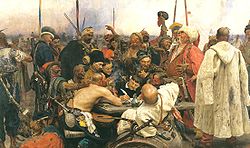- Danube Cossack Host
-
Part of a series on Cossacks 
Cossack hosts Azov · Black Sea · Buh · Caucasus · Danube · Don · Volga · Ural · Terek · Kuban · Orenburg · Astrakhan · Siberian · Baikal · Amur · Semirechye · Ussuri · Zaporozhia Other groups Danube (Sich) · Tatar Cossacks · Nekrasov · Turkey · Jewish Cossacks History Registered Cossacks · Kosiński Uprising · Nalyvaiko Uprising · Khmelnytsky Uprising · Hadiach Treaty · Hetmanate · Colonisation of Siberia · Bulavin Rebellion · Pugachev's Rebellion · 1st Cavalry Army · Decossackization · Betrayal · XV SS Cossack Cavalry Corps · 1st Cossack Division Famous Cossacks Bohdan Khmelnytsky · Petro Sahaidachny · Ivan Vyhovsky · Petro Doroshenko · Ivan Mazepa · Ivan Sirko · Yemelyan Pugachev · Stenka Razin · Yermak Timofeyevich Cossack terms Ataman · Hetman · Kontusz · Papakhi · Plastun · Szabla · Shashka · Stanitsa · Yesaul Not to be confused with Danubian Sich.The Danube Cossack Host (Russian: Дунайское Казачье Войско) was an Imperial Russian Cossack Host formed in 1828 prior to the Russo-Turkish War (1828–1829), on the order of Emperor Nicholas I from descendants of the Zaporozhian Cossacks living in Bessarabia and in particularly the Budjak. Russian Cossack Host named Lower-Danube Budjak Host had been formed there in 1807 but was disbanded soon afterwards. The Host also included many volunteers from the Nekrasov Cossacks and the Balkan peoples such as Romanians, Serbs and Bulgarians. Initially three selos of the Akkerman poviat where in the Cossacks control: Akmangit, Starokazachye, and Volonterovka.
Overview
After the War, the Host was tasked with guarding the borders of the Bessarabian and Kherson Governorates, and it had outposts in Odessa, Izmail and Akkerman, which also housed the central headquarters. Initially as Wallachia was administered by Russia, the Tsar expected all of the Nekrasov Cossacks that remained in the Danube Delta to join this Host as well, however most refused further military service. Instead in 1839, concerned with extent of Gypsy activities, Russia suggested to enlist them as Cossacks. Although most Gypsies chose to decline the offer, those that did would make nearly quarter of the Cossacks in the Host[1]
During the Russo-Turkish War, 1853-56, the Danube Cossacks became famous for their Rocket artillery in the capturing of Tulcea, Isaccea and Măcin, which supported the main armies in covering their bridgeheads and preventing the Turkish Army from breaking to the Danube. Both Danube Cossack regiments were awarded the Georgian Banners. After the 1856 Treaty of Paris, Russia ceded some of the Budjak territory and the Host moved to stanitsa Nikolayevka-Novorossiyskaya (modern selo within the Odessa Oblast, Ukraine), consequently, losing the Danube river, the Host was renamed to Novorossiyan Cossack Host (Russian: Новороссийское Казачье Войско) in 1856.
By 1858 the new Host had 10 stanitsas and numbered twelve thousand men. However in the next decade, a time of relative peace, most lost their combat ability and were involved in internal customs and police service, and in 1868 in wake of the administrative reform of Emperor Alexander II, the Host was disbanded, and most of the Cossacks continued service in customs and police, but now under civil administration.[2] With that, ended the nearly of Cossack presence in the Budjak territory. Today there are efforts to re-create the Cossack lifestyle centered in that province by local enthusiasts, though it has made little progress yet.
References
- ^ Olena Bachynska, Danubian (NovoRossiyan) Cossack Host 1828-1868. Published in the Cossackdom of Southern Ukraine ХVІІІ - ХІХ centuries p.177-229 Odessa 2000; Available online at Cossackdom.com
- ^ Shambarov, Valery (2007). Kazachestvo Istoriya Volnoy Rusi. Algorithm Expo, Moscow. ISBN 987-5-699-20121-1.
External links
- Uniforms of the Danube Host (Russian)
Categories:- History of Romania
- History of Ukraine
- Cossack hosts
Wikimedia Foundation. 2010.
